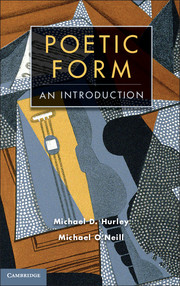Chapter 1 - The Elements of Poetic Form
Published online by Cambridge University Press: 05 November 2012
Summary
[A]lways somewhere under the live and speaking idiom of the Voice in poetry there is the count, the beats you can count on your fingers. Yes always under the shout and the whimper and the quick and the slow of poetry there is the formal construction of time made abstract in the mind’s ear. And the strange thing is that that very abstract dimension in the poem is what creates the reader’s release into the human world of another.
W. S. GrahamGerard Manley Hopkins observed that the ‘artificial part of poetry, perhaps we shall be right to say all artifice, reduces itself to the principle of parallelism’. His phrase catches well the sense in which words are heightened into poetry by organising language into expressive patterns (parallelisms): sounds into rhyme schemes, rhythms into metre, lines into stanzas; and so on. This chapter identifies, and attempts briefly to characterise, these common poetic building blocks that combine to create the different poetic genres considered in the book’s subsequent chapters.
It must be emphasised from the outset that even where they draw on longstanding and widely used conventions, the descriptive categories required for such a taxonomy are on inspection nothing like as sturdy as the ‘building blocks’ metaphor implies. The very term for the study of verse form itself is a point of contention (although this book treats ‘versification’ and ‘prosody’ as synonyms, there are arguments for distinguishing between them), and a similar contrariety, inconsistency and confusion over terms – the implications of which extend far beyond mere semantics – seemingly attends every poetic feature and effect. ‘I have read or invented twenty definitions of Rhythm and have adopted none of them’, complained Paul Valéry: ‘If I merely stop to ask what a Consonant is, I begin to wonder’. Such vacillation and vertigo is understandable, even inevitable. More than this, it is welcome. Analysis of verse form invites ‘wonder’ in both senses of the word, and persistent uncertainty over even the most basic elements may helpfully disturb critical complacency into aesthetic appreciation for what may be felt beyond what can be classified. The definitions that follow are, then, all working definitions as opposed to definitive categorisations; the approach of this chapter and the book is avowedly pragmatic: ‘to look for precision in each class of things just so far as the nature of the subject admits’.
- Type
- Chapter
- Information
- Poetic Form , pp. 16 - 52Publisher: Cambridge University PressPrint publication year: 2012



